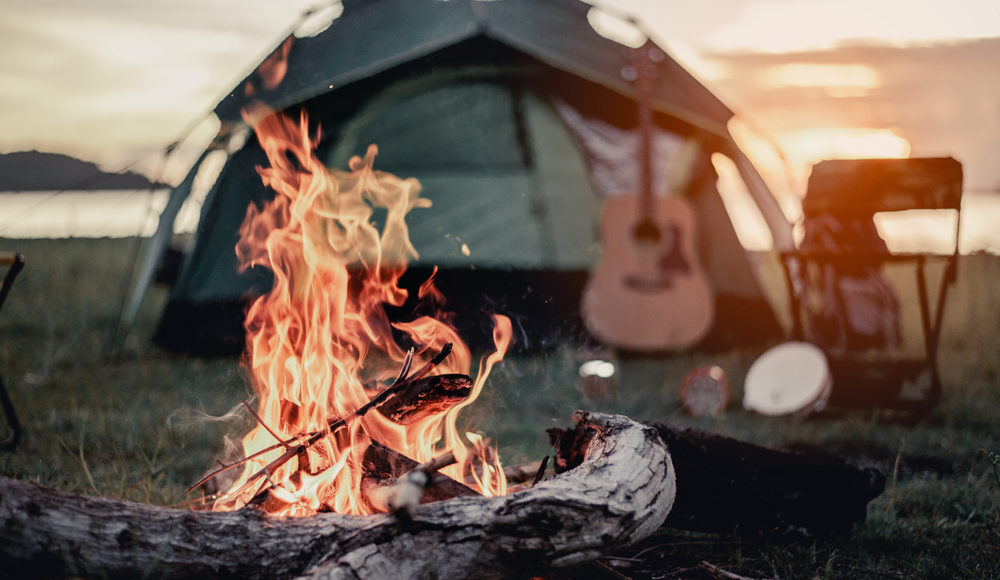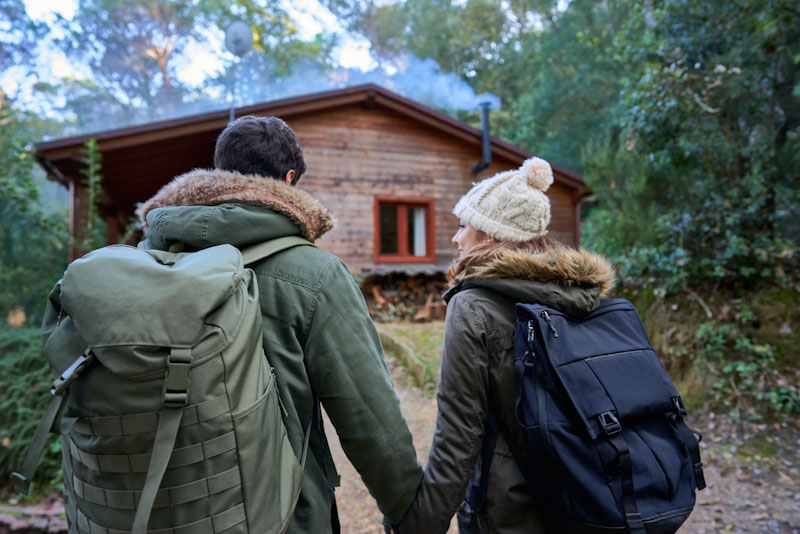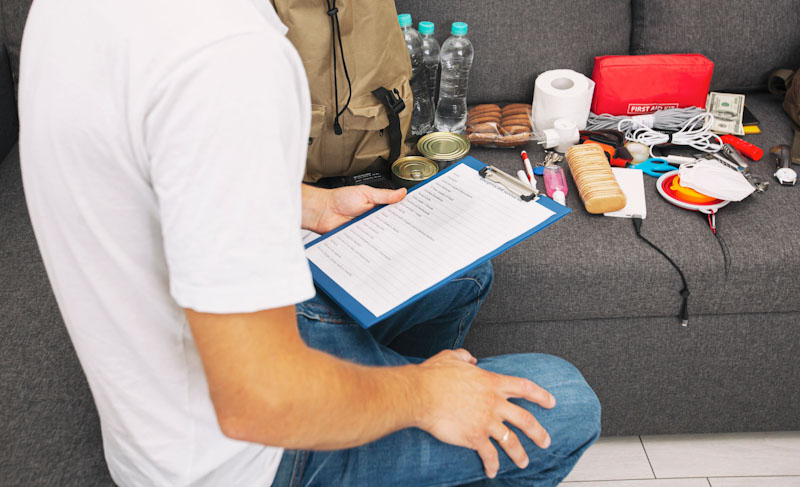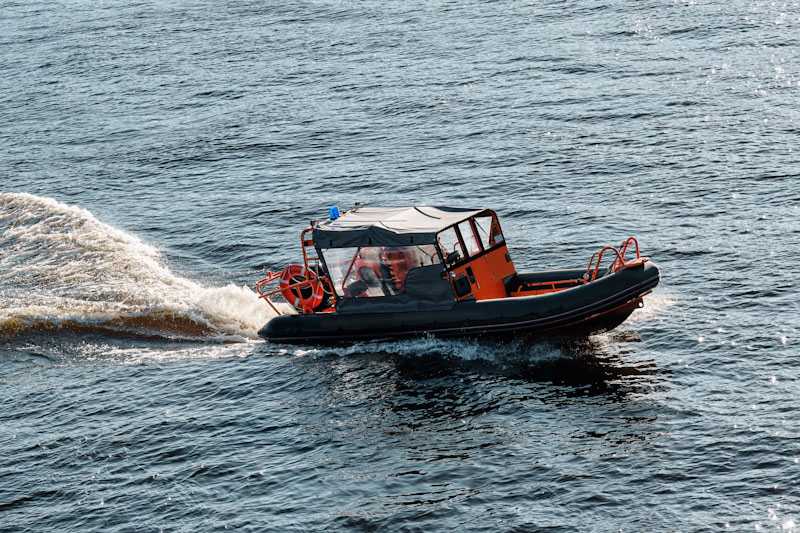Most preppers include planning a bug out as part of their survival plans. We do extensive work in building bug-out bags (BOBs), bug-out vehicles (BOVs), and talking about spending time in the woods. Some preppers sound like they can’t wait for the opportunity to head for the hills, getting away from civilization and living off the land. It doesn’t matter how realistic their plans are or aren’t; it’s what they want to do.
There is probably some truth to the idea that bugging out will include at least a couple of nights of camping out in the woods. If any of us are forced to bug out, there will likely be a whole lot of other people doing so as well. Hotels will fill up early, and unless we want to end up in a refugee center somewhere or sleeping in the car, we’d better plan on setting up camp someplace, preferably someplace that we choose, which offers us the best possibilities.
This doesn’t necessarily mean that we’re planning on bugging out to the woods. Unless you happen to own a cabin in the wood somewhere or have some property in mind that you know you can use and a portable shelter, such as a travel trailer, it’s probably not going to be a good idea to bug out to the wilderness on a semi-permanent basis. Instead, you need a destination you can go to, where your family will be safe, and you’ll be able to find the resources that you need.
While there may be certain aspects of those few nights in the woods, like going on a camping trip, there are definite differences. We need to be aware of those differences to make sure that our overnight camp is comfortable and safe.
Prepare Properly
I’m sure you’ve got a bug-out bag ready to go or perhaps even bug-out bags for every member of the family. That’s great, but if you’re going to be bugging out in a vehicle, it just makes sense to use whatever space you have available to you to take as many usable supplies and equipment with you as possible. This includes taking a tent and sleeping bags. Why take the time to build a shelter out of found materials when you can put up a tent in minutes?
The difference between the bug-out bag and what you pack in the bug-out vehicle is that the bug-out bag contains the bare minimum you need to have to survive. That way, if you have to abandon your vehicle and go on foot, you’ve got what you need, including a few days’ worths of food.
In reality, you’re going to need a lot more than three days’ worth of food. That’s only supposed to be enough to get you to your survival retreat, where you should have food stockpiled. You’re also going to need more clothing than what you’re wearing and a host of other things that won’t fit in your bug-out bag. Unless you’ve got a cache of those things in your survival retreat, you’re going to need to take them with you in your BOV.
Now here’s the problem; while we may be able to set aside the gear in our bug-out bags, leaving them packed, we probably can’t set aside everything else that we need to take. But we can decide what those things are, determine how we will pack them, and create checklists. That way, when it’s time to bug out, we can quickly gather up the things we’re planning on taking without worrying about what we might have forgotten.
Be sure to do a dry run or two of this packing process so that you can make sure things will pack as you want and fit in the vehicle like you want. If you can, take that a step further and camp out, using that gear, so that you can make sure that you have everything you’re going to need.
Cutting Free From the Herd
You’re going to need to start thinking about setting up camp long before it’s time to do so. We usually figure two hours to set up camp, but before that two-hour begins, it’s going to be necessary to get off the road, away from other people, and find a suitable place to set up camp.
There’s no telling just how long all that will take, so make sure you give yourself adequate time; another two hours would not be unreasonable. I realize that cuts into travel time, making it so that it will take longer to get to your survival retreat, but it will also help make sure that you get there alive.
One of the biggest problems is getting away in such a way that others don’t follow you, either physically or with their eyes. It’s impossible to do that, so what you’re going to have to do is get far enough off the road that anyone who tries to follow you gets lost and gives up before they get to wherever you set up camp.
As you’re leaving the main road, keep a wary eye out for those who might follow. Take note of any other vehicles that leave the road, noting not only what kind of vehicle it is but how many people are in it. That could be invaluable information if you run into that vehicle again.
It’s also a good idea to use a crooked path to get to your campsite, taking extra turns, doubling back, stopping to watch your back trail, driving on surfaces where you won’t leave a track, and even driving through water if you can. All the usual tricks for shaking a tail that you can find in any spy novel. Don’t wonder if you have that tail; assume that you do and try to shake it.
The other important thing is that you get far enough from any roads, preferably with hills between you and those roads, to hide any light from your camp. You’d be amazed just how far the light from a flashlight or campfire will go, drawing others to you, like moths to a flame.
Finding an Overnight Campsite
As you are traveling towards your ultimate stop for the night, keep your eyes open for the resources you’ll need, specifically water and firewood. It would probably be best to avoid camping alongside any body of water, as others will be looking for water too. While you may be able to find firewood at your campsite, you can’t be sure of it. Collecting it along the way eliminates one worry, keeping you from having to leave the campsite once you’ve gotten there.
The kind of campsite you’re looking for probably isn’t going to be what you’d look to use for a weekend camping trip. Your main goal then is perhaps finding a scenic stop with good fishing. But that campsite will be in high demand with so many others on the road. What you need is somewhere where you can remain hidden from anyone else out there.
Ideally, you need to find a hollow in the hills, where the hills and vegetation will hide both your campsite and the light reflecting from your fire. Any light will attract other people, and you don’t know what sort of people those will be.
Water is nice to have, but water will attract others. As I mentioned a moment ago, you’ll want to get water before getting to the campsite. Keep your eyes open for water as you seek out a site, as you’re going to need more water in the morning. Once you break camp, it would be good to stop and top off your water containers before starting the day’s driving.
As you are heading into your campsite, circle it first, looking for signs of other people, predators, and any game in the area. Game could provide your family with food, but the others could only provide danger. Take your time checking the area out carefully, as signs may not be all that obvious. It will probably be necessary to dismount from your vehicle and check on foot, circling the potential camp, while the family remains alert in the vehicle to any approaching danger.
Once you are reasonably sure that the campsite is safe, move your vehicle into it and hide it, cutting branches to cover the vehicle. Sunlight reflecting off of windows can be seen from a long way away, so take special care to protect the windows that will likely reflect the sun both in the evening and early in the morning.
Military units carry along camouflage netting for this, but that’s bulky and heavy. As an alternative, you could carry a green canvas tarp that you can throw over the vehicle, weighing it down with a few branches. Avoid plastic tarps as they tend to be reflective.
Setting Up Your Campsite
Usually, setting up camp consists of erecting shelters and starting a fire. Those are important during your bug out too, but there’s something that has to come first, before them. That’s sketching out a rough defensive plan. That should include which family members will take off into the bush to be in a position to offer support to those in the camp and a surprise to anyone who tries to attack. So, before doing anything else, decide what you’re going to do if someone else shows up and make sure everyone knows it.
You’ll probably want to wait until after setting up your shelter and building a fire, but it’s a good idea to establish shooting positions and drag good cover into place. There are often deadfalls that can be drug into place for cover and concealment, and unless you leave an undeniable trail doing so, most people won’t catch that you’ve moved them.
If you’ve bothered to bring along a tent, setting up camp is going to be much easier than it would be without one. Most tents can be set up in a matter of minutes and will keep your family dry and comfortable, even if it rains. Just be sure to take the necessary precautions, such as staking the tent down and digging a gutter for water around the tent so that if it does rain, the water has a path to take. Avoid putting the tent and fire in the lowest point of a hollow so that it is always someplace for water to drain off.
Start your fire as soon as possible and burn as much wood as you can before sunset, building up a nice collection of coals. Most of the heat from fire comes from those coals anyway, and they won’t throw light as far as the flame will. If you can get a good bed of coals built up before sundown, it will help to keep you warm without the risk of attracting attention by putting fresh logs on the fire.
In addition to that, try to build up barriers around the fire. This is part of setting up a fire anyway, building heat reflectors and windbreaks. All I’m adding to that is making sure that those are placed in such a way as to block off light escaping from the fire and letting others know where you are. If your windbreak, heat reflector, or firewood pile can provide that additional service, it will help protect your family even more.
Breaking Camp
Besides setting up camp, the other vulnerable time is when you’re breaking camp in the morning. Typically, everyone in the family will be busy with camp activities, from making breakfast to striking the tent. If water is nearby, one or two family members might be taking water bottles off to fill them. In the midst of all that, it’s easy for someone to walk up to your campsite and surprise you, getting the jump on you.
The simple solution to that problem is to have someone on guard duty. That’s something you should be doing all the time anyway. Guard duty may not seem like work, but it’s as essential as any other work your family will have to do to set up or strike camp. Take turns with the duty or assign someone that can’t do the more physical work.
Whoever is on guard duty doesn’t necessarily need to be ready to fight off anyone who approaches your camp. Instead, they need to be someone who will notice and raise the alarm. After that, they might even be one of the family members who goes and hides in the woods, just as long as others know the potential danger and are dealing with it before they relinquish their post.
The faster you can break camp and get back on the road, the better. Unlike setting up camp at night, it shouldn’t take all that long to strike center. There’s nothing you need to look for or keep. Just make sure that you put the fire out and that you’re sure it is out. Other than that, you can even eat back on the road.
If possible, return to the road at a different point than you left it. That will deny anyone watching for you the opportunity to see you come back. To those you encounter when entering the flow of traffic, you’ll be just one other person who is evacuating. They won’t know where you spent the night or even that they should care where you spent the night.
Another option to consider, if you find a good campsite and have enough supplies, is staying put in the campsite for a couple of nights, allowing the traffic on the roads to diminish. Remember, your goal is to bug out; not necessary to win any race. If taking your time gives you a better outcome, then it is the way you need to go.












Mark | February 15, 2022
|
And after you’ve made your shelter, gathered water, gathered wood for a fire, hid your vehicle from site, made dinner or whatever and bed down for the night trying to keep your barking dogs quiet so they don’t give away your spot… you’ll now have time to think about how many people are squatting in your home you just left behind, using your wood burning oven or fireplace (with fully stocked firewood) to stay nice and toasty, eating all the “forever shelf life” food that was in your pantry (or hiding place) that you couldn’t bring with you, but that you spent thousands of dollars on…for this very moment, drinking all your water that you’ve stockpiled over the years…because you know…we’re preppers, access to all your guns and ammo that were too bulky to bring along with you, using said guns and ammo to ward off/shoot OTHER thieving thug squatters, sleeping in your warm cozy bed’s/couches…I think you can see where I’m going with this. I have read many of these “bug out” articles over the years, and I’ve always wondered…WHY !! (with the exception of a state wide government enacted Martial law) why pack up the whole family and dogs and Susie’s pet goldfish Bubbles and leave your sanctuary with all the above listed amenities to go where ? To some bug infested, cold, wet,(or hot) unfamiliar chunk of wilderness, that may or may not be inhabited already…with a tent and sleeping bag ? and of which you may still have to protect yourself/family there as well, ( by any means necessary. ) Also these articles indicate that you may be there overnight, maybe a couple nights ?…then what ? I just don’t get it I guess. I’ve worked hard my entire adult life to build and live in the home I love with my family I love, not to be downgraded to a 3 person tent at the drop of a hat because some mob thug militia thinks they are entitled to everything I’ve built in my lifetime. This scenario works best (as Bill alluded to) if you are one of the lucky, small percent of folks that DO have a summer cabin or hunting cabin secluded out in the woods somewhere that’s fully stocked. But that’s not me. I just don’t understand why it is so important that most all of these “If SHTF” articles, the #1 thing we’re instructed to do is “bug out”. Why not educate us on the many ways and tactics to defend ones home, or neighbors home first ? I think I would take my chances in the comfort of my home, that I know like the back of my hand at night or daytime and can easily guard entrances, windows etc. and having my neighbors do the same thing (In my case, I have some very trustworthy neighbors (two that are ex military and still young that will always believe in the 2nd amendment) we will form our neighborhood watch, it’s already been discussed, we know everyone that’s supposed to be in our cul-de-sac. To me, it’s as simple as that. Don’t get me wrong, I do believe in having a backup plan, but it’s just that…a backup plan. You see an angry mob heading towards your neighborhood driving a couple of tanks…yeah, might be time to go, (maybe) These articles tell us to enact our backup plan first thing, that is what I’m having a hard time with. OK, so you want to avoid any type of violence or your family getting hurt, so you wanna leave from there “bug out”, I get that I suppose, but like I said, you may find that wherever you lay your sleeping bag too. I share this opinion with others that I know, so I know I’m not the only one who’s thought about this, and for the folks that want to dip out and leave the safety of your home at the first sign of trouble, (like I said earlier, with the exception of martial law) fine, that’s up to you, to each their own right ? I know everyone has differing opinions and this one is mine. Thanks for reading my rant .
Travelin On | April 5, 2024
|
One more point that may need to be made, while people are bugging out and squatters have moved into a pepper’s home and are using their supplies and weapons, they will use them on the legal owners when the legal owners try to return and in many states these days the squatters have more rights than do the legal owners. One more thing to be aware of if you consider bugging out.
Alan | February 16, 2022
|
To Marks point, it really is necessary to stay in place in your own home. The only time you should go if it’s life-threatening to stay. I think “bugging out” was or should always meant to be temporary in a worse case scenario of the Government evacuating people in the face of disasters or angry mobs of people moving through the town robbing and killing because of economic hardship or political unrest.
Unless you are well seasoned in Bushcraft skills and can secure a bug-out shelter and sustain yourself with food and water for weeks if not months, you should stay home. Blending and hiding and being a ‘grey-man’ while sneaking supplies around town might be a better option.
steve | February 17, 2022
|
I can not think of what would make me bug out from my home ( but I am ready to do if I must ) I live in the great north woods of MN. am well stocked and well armed . I know who will be coming to my place when the SHTF and just hope the bands of looters do not come down my dead end dirt rode . I do not want to hurt anybody but will protect my family . If you are in the big city I hope you can get out before the looters and the rapists come calling If you dont have a gun get one . We all prep and pray we will never need it
Travelin On | July 22, 2023
|
Another point that always seems to be missing in these bug out articles is about where you’re bugging out/camping out and whether it’s legal, or not, to bug-out/camp out where you’re planning to stay for a night or three. Be wary of fenced areas, even unfenced areas, know who owns the land. There are states who have no problems with owners killing trespassers at will, no second chances, they find a trespasser and you’re dead before you even knew you were in danger. In such a case as masses of people bugging out and needing camping spots for a night or three along the way due to civil unrest or other emergencies with required evacuations from your home port, if you choose to camp out on someone else’s land, YOU become the intruder, the trespasser and the violator creating civil unrest yourself. If “No Trespassing” signs are posted, then camp in your “bug-out” way at your own risk. It could mean it is your last act of life. One can guarantee the owners of land are going to be just as protective of their property in such a situation and it will include all the preppy bugger-outers leaving hearth and home, and land owners won’t have any problems shooting first and burying bodies far from the road in your perfect little camp out site. Be sure when you leave the road, leave no trail, lose anyone tailing you, that you’re also prepared to never be seen or heard of again. Bugging out doesn’t allow one the right to disrespect other’s land and property nor does it give any “prepper” any right to trespass in their camping out just because they personally are in a “bug-out” situation. Be sure you, in your bugging out, if ever required, do not become the cause of anything illegal or create civil unrest for the land owner. Even if the law did become aware of what happened and decided to prosecute a land owner, it would still be way too late for all those who were killed and buried as trespassers.
Briley | July 22, 2023
|
Regarding your statement that “There are states who have no problems with owners killing trespassers at will, no second chances, they find a trespasser and you’re dead before you even knew you were in danger.” This is not the case in any state, unless the land owner is being threatened with deadly force or he/she fears, with reason, that the other person(s) will kill or presents indications that the perp intends to seriously harm him/her. (that’s the short version). Trespassing in and of itself does not invoke a right to kill someone anywhere other than within your domicile, which could be your vehicle, tent or abode — hotel room, that sort of thing. On the other hand, I know some batshit crazy land owners, with backhoes, who wouldn’t give a second thought to plugging a stranger, so yeah, it be best to know who owns the spot…or to shoot first. If there were a Mad Max sort of breakdown in society, I think laws and the law would be the least of my concerns.
Travelin On | April 5, 2024
|
In the event of civil unrest and rebellion, there aren’t going to be any laws but what those who have lots of guns and ammo make. There are states, much to your ignorance, who do allow land owners to post signs that say, “NO TRESSPASSING, TRESPASSERS WILL BE SHOT, NO SECOND CHANCES.” They have used that force when trespassers disrespected the signs and the law has backed the land owners up. You need to educate yourself. You also need to keep in mind that when “bug out” time comes there won’t be any more civil law.
Ed Y | July 24, 2023
|
On that trespassing topic, be very wary of coal mining country Eastern KY, WV, ,Southern PA especially. These folks have been dodging Feds for a while and being suspicious of outsiders is ingrained in their DNA. It is best to visit your backup area and make friends with the locals though local bars, gunshops, and hunting with them. They are invaluable resources for knowledge, and a good way to get permission ahead of time to avoid resting forever in an old mine shaft.